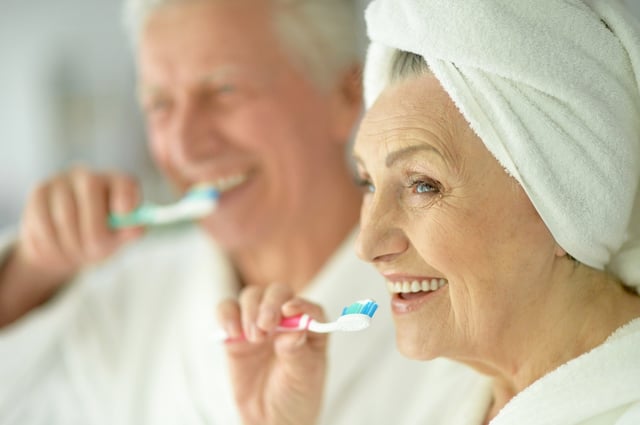
Maintaining good dental health isn’t just about having a bright, winning smile—although that’s a great goal. It’s also about maintaining overall good health. Studies increasingly show that healthy teeth and gums correlate to overall health, especially a healthy heart. While that’s true for anyone, it’s especially important for seniors. As we age, changes can occur in our oral health, including drier mouth and sensitive gums and teeth. But these can be avoided. Here are four simple tips for dental and oral care for seniors.
Brush Your Teeth Regularly
A rule of thumb is to brush at least twice a day. Brushing after every meal or snack is probably wise, but not always convenient. Luckily, there are many products that can help on the go. These include specialty chewing gums and mini-brushes with toothpaste-like fresheners built in.
For use at home, it’s important to choose the right toothbrush. Your dentist or hygienist can help you choose, but many prefer a soft bristle for a manual toothbrush. Others recommend electric toothbrushes, which have been found to be effective in controlling tartar.
A good toothpaste is also important. Again, it’s best to talk with your dentist, especially if you have sensitive teeth. There are many options to choose from, and your dentist will have samples for you to try to find what works best for you.
Flossing is a Good Thing
 Flossing is another very important part of dental care. It helps remove any food particles that can get stuck between teeth and provides a massage-like stimulation to the gums, which keeps blood flow healthy. When flossing, pay special attention to any areas that your dentist or hygienist may have pointed out. These may include particularly sensitive areas or a larger space between teeth.
Flossing is another very important part of dental care. It helps remove any food particles that can get stuck between teeth and provides a massage-like stimulation to the gums, which keeps blood flow healthy. When flossing, pay special attention to any areas that your dentist or hygienist may have pointed out. These may include particularly sensitive areas or a larger space between teeth.
There are many types of floss on the market, including different sizes, waxed or unwaxed, and flavored. Choosing which to use is a matter of personal taste and any recommendation your dentist has made. Most dentists will have samples of products they recommend.
Besides floss, there are other oral-care products your dentist may recommend such as various types of soft picks. These can address anything that’s particular to your mouth or teeth and have the added advantage of being portable.
Use a Recommended Mouthwash
Many dentists recommend regular use of a mouthwash to help control bacteria. Plus, using a mouthwash helps maintain fresh breath and a clean feeling. There are also many forms of sprays, gums, and mints that are on-the-go alternatives to a mouthwash. When selecting any of these products, avoid the ones that contain sugar and consult with your dentist or hygienist on which specific brands they recommend.
See Your Dentist and Hygienist Regularly
Most dentists recommend semi-annual checkups and cleanings, and that’s a good guideline to follow. Your dentist may recommend more frequent visits if necessary or if you’re watching something like plaque build-up, a sensitive tooth, or even dry mouth. Be sure to keep all your appointments and don’t hesitate to schedule a checkup if anything changes or you have questions. As with the rest of your health, the sooner you address any concerns, the better off you’ll be. As the old saying goes, “An ounce of prevention is worth a pound of cure.”

